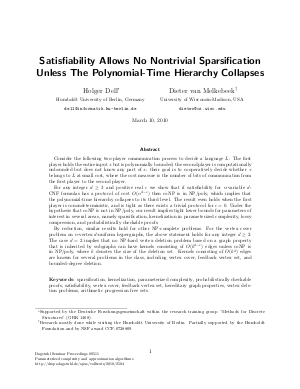Satisfiability Allows No Nontrivial Sparsification Unless The Polynomial-Time Hierarchy Collapses
Authors Holger Dell, Dieter van Melkebeek
-
Part of:
Volume:
Dagstuhl Seminar Proceedings, Volume 9511
Part of: Series: Dagstuhl Seminar Proceedings (DagSemProc) - License:
 Creative Commons Attribution 4.0 International license
Creative Commons Attribution 4.0 International license
- Publication Date: 2010-03-11
File

PDF
DagSemProc.09511.7.pdf
- Filesize: 389 kB
- 29 pages
Document Identifiers
Subject Classification
Keywords
- Sparsification
- Kernelization
- Parameterized Complexity
- Probabilistically Checkable Proofs
- Satisfiability
- Vertex Cover
Metrics
- Access Statistics
-
Total Accesses (updated on a weekly basis)
0PDF Downloads0Metadata Views
Abstract
Consider the following two-player communication process to decide a
language $L$: The first player holds the entire input $x$ but is
polynomially bounded; the second player is computationally unbounded
but does not know any part of $x$; their goal is to cooperatively
decide whether $x$ belongs to $L$ at small cost, where the cost
measure is the number of bits of communication from the first player
to the second player.
For any integer $d geq 3$ and positive real $epsilon$ we show that
if satisfiability for $n$-variable $d$-CNF formulas has a protocol of
cost $O(n^{d-epsilon})$ then coNP is in NP/poly, which implies that
the polynomial-time hierarchy collapses to its third level. The result
even holds when the first player is conondeterministic, and is tight as
there exists a trivial protocol for $epsilon = 0$. Under the
hypothesis that coNP is not in NP/poly, our result implies tight lower
bounds for parameters of interest in several areas, namely
sparsification, kernelization in parameterized complexity, lossy
compression, and probabilistically checkable proofs.
By reduction, similar results hold for other NP-complete problems.
For the vertex cover problem on $n$-vertex $d$-uniform hypergraphs,
the above statement holds for any integer $d geq 2$. The case $d=2$
implies that no NP-hard vertex deletion problem based on a graph
property that is inherited by subgraphs can have kernels consisting of
$O(k^{2-epsilon})$ edges unless coNP is in NP/poly, where $k$ denotes
the size of the deletion set. Kernels consisting of $O(k^2)$ edges are
known for several problems in the class, including vertex cover,
feedback vertex set, and bounded-degree deletion.
Cite As Get BibTex
Holger Dell and Dieter van Melkebeek. Satisfiability Allows No Nontrivial Sparsification Unless The Polynomial-Time Hierarchy Collapses. In Parameterized complexity and approximation algorithms. Dagstuhl Seminar Proceedings, Volume 9511, pp. 1-29, Schloss Dagstuhl – Leibniz-Zentrum für Informatik (2010)
https://doi.org/10.4230/DagSemProc.09511.7
BibTex
@InProceedings{dell_et_al:DagSemProc.09511.7,
author = {Dell, Holger and van Melkebeek, Dieter},
title = {{Satisfiability Allows No Nontrivial Sparsification Unless The Polynomial-Time Hierarchy Collapses}},
booktitle = {Parameterized complexity and approximation algorithms},
pages = {1--29},
series = {Dagstuhl Seminar Proceedings (DagSemProc)},
ISSN = {1862-4405},
year = {2010},
volume = {9511},
editor = {Erik D. Demaine and MohammadTaghi Hajiaghayi and D\'{a}niel Marx},
publisher = {Schloss Dagstuhl -- Leibniz-Zentrum f{\"u}r Informatik},
address = {Dagstuhl, Germany},
URL = {https://drops.dagstuhl.de/entities/document/10.4230/DagSemProc.09511.7},
URN = {urn:nbn:de:0030-drops-25043},
doi = {10.4230/DagSemProc.09511.7},
annote = {Keywords: Sparsification, Kernelization, Parameterized Complexity, Probabilistically Checkable Proofs, Satisfiability, Vertex Cover}
}
